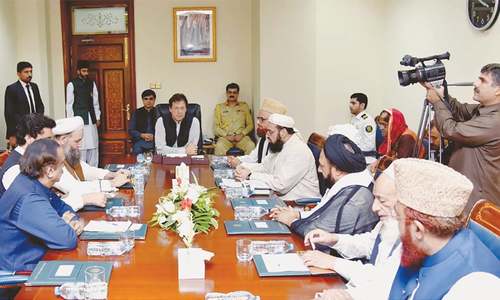MADRESSAH reform has had a chequered history in this country; whenever a new dispensation takes over, there seems to be great zeal for reforming religious seminaries.
However, with the passage of time this passion for change dies down and the initiative is put on the back burner. In the aftermath of the Sept 11 attacks, the Musharraf regime took up the gauntlet of madressah reform with great gusto.
Yet, the fact that we are still talking about the need to reform seminaries shows that nothing much has been accomplished.
On Wednesday, Prime Minister Imran Khan discussed issues related to religious schools with heads of the country’s five madressah boards, affiliated with various religious sects.
Mr Khan said that the government wanted to do away with class-based education and introduce uniform syllabi, adding that multiple education systems in the country were counterproductive.
He also reiterated the desire that many governments over the past few decades have aimed to achieve: mainstreaming of madressah students and involving them in all sectors of life.
Indeed, it is unfair to label all madressahs as hotbeds of extremism and militancy.
Many parents, driven by poverty, send their children to seminaries as they provide free lodging and meals, as well as impart basic literacy skills to young ones along with religious instruction.
In fact, it is the failure of the public school system that has pushed many parents to send their offspring to seminaries.
So the state’s desire for a uniform education system must be lauded. What is problematic, however, is that militant and sectarian organisations use certain madressahs as fronts for recruiting fighters and raising funds.
Moreover, some religious schools have a narrow focus that brainwashes students, with the result that madressah students are taught to hate sects and religions other than their own.
It is these matters that need the government’s urgent attention, for the sake of internal security and communal harmony.
Any seminary promoting militancy and hatred of others must be dealt with under the law. There is also a need to register and deal with thousands of illegal madressahs operating in the country, as outlined in the National Action Plan.
Indeed, if sectarian and extremist material is excised from the curriculum, and modern subjects are taught to students, children studying in madressahs can contribute positively to national life, supplementing their religious education with life skills.
The government must, therefore, take madressah reforms to their logical conclusion.
Published in Dawn, October 5th, 2018














































